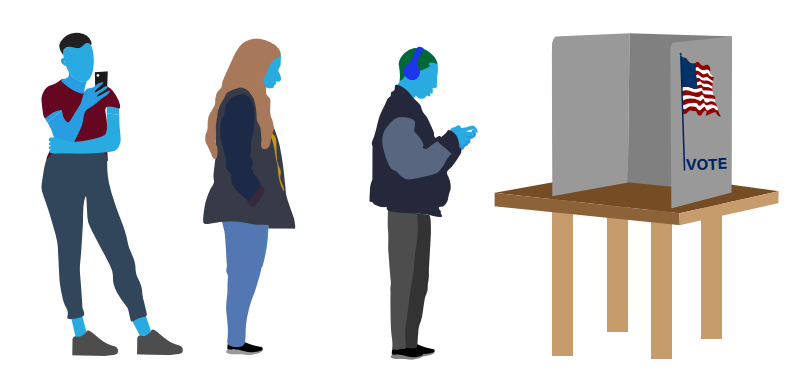Editorial: Youth Push for the Polls
Teens Nationwide Fight for a Lower Voting Age
May 15, 2023
From 1947 to 1973, the United States’ Selective Service System called more than three million young men for compulsory service in the Korean and Vietnam wars. Though they were expected to lay their lives down for their country, until 1971, many were not permitted to participate in the representative government of that country. It was only in that year that the 26th Amendment to the United States Constitution prohibited age-based limitations on voting for those above the age of 18, yielding to the demands of those who claimed that they were “old enough to fight, old enough to vote.”
Though 18 is generally considered to be the age at which adolescents can be expected to take on adult responsibilities, some claim that the standard no longer applies as it once did. Today’s teenagers work and pay taxes well before 18, and are exposed to the brutal realities of the modern world, ranging from racism to school shootings, from childhood. Given the new opportunities for civic participation presented to young people by the internet, some have advocated granting the vote to those over 16 years of age.
Among those in support of lowering the voting age at the national level is U.S. Rep. Grace Meng of New York’s sixth congressional district. In January Rep. Meng reintroduced legislation to amend the Constitution to prohibit age-based voting discrimination against those over 16 years old. Though the proposal has not gained significant traction in Congress and is unlikely to lead to any real constitutional change in the foreseeable future, it is one of the most visible examples of a move toward including younger people in the broader push for expanded voting rights. Additionally, legislation to allow 16-year-olds to vote in state elections has appeared in legislatures including those of California and Massachusetts, and some towns and cities, including multiple Washington suburbs in Maryland, have extended the vote to younger teens in local elections. Internationally, 16-year-olds have attained voting rights in Austria, Brazil, and more than a dozen other countries.
Vote16USA is an organization, affiliated with the nonprofit Generation Citizen, that advocates for lowering the voting age to 16 across the country. One of the foremost arguments that Vote16USA puts forth for lowering the voting age is the opportunity to instill a habit of voting in teenagers before they leave home. According to a study published in the American Journal of Political Science and conducted by Alan Gerber and other authors, voting in one major election may increase the likelihood that one will vote in the next by more than 25%. However, the majority of Americans do not vote in the first election in which they are eligible, leading to lower rates of voting in early adulthood. According to Youth Service America, the major life changes that come with turning 18, along with the lack of logistical support for young voters, deter voters from voting at first eligibility. Advocates of lowering the voting age argue that allowing teens to vote for the first time while still living at home would increase the likelihood of them voting, thereby creating habits of civic participation that would last throughout their lives.
The case for a lower voting age also takes into account the effects of the political process on young people. 16 and 17-year-olds are directly affected by local, state, and national debates on education funding, gun control, fiscal policy, and climate change, among other issues. Considering that, according to the Census Bureau, the majority of American voters are over the age of 45, and that voting rates invariably increase with age, the share of the American population with the most sway over the government is not that which is most affected by its decisions. Bringing more young people into the political process could reorient the government toward forward-thinking, long-term solutions that are more likely to serve the nation’s future.
There are, of course, serious concerns about the negative effects changing the voting age could have on the health of democracy in America. 16 and 17-year-olds are unlikely to have finished their states’ civics education requirements, making them less qualified to participate in representative government. Additionally, according to a study published by the Political Studies Association and written by Tak Wing Chan and other authors, 16 and 17-year-olds tend to demonstrate lower interest in politics and less civic knowledge than their older peers, a concerning characteristic among any voting demographic. Even the youngest age group of those currently allowed to vote, Americans ranging from 18 to 24 years of age, only exhibit about 50% participation in elections, according to multiple studies and Census Bureau statistics. Of 18-year-olds, only about 13% choose to vote, demonstrating that the youngest among the American population are less likely to be politically engaged and informed.
Finally, there is the consideration that the vast majority of Americans, even young ones, oppose lowering the voting age. A Hill-HarrisX poll found that a whopping 84% of American voters do not want to see the vote extended to 16-year-olds, with a solid majority opposed even in the youngest age group polled. This view transcends party lines, with large majorities of Democrats, Republicans, and independents supporting maintaining the current voting age. While numbers are subject to change, support for a change is not currently anywhere near what it would need to be to make a constitutional amendment feasible.
While the voting age is unlikely to change anytime soon, the conversation can still serve as a useful catalyst for engaging young people in civic participation. If 16 and 17-year olds are more engaged with the life of their nation, they are more likely to make informed and responsible decisions when voting as adults. As the United States relies on a healthy republican government, increased youth involvement would be a boon for the country as a whole.


